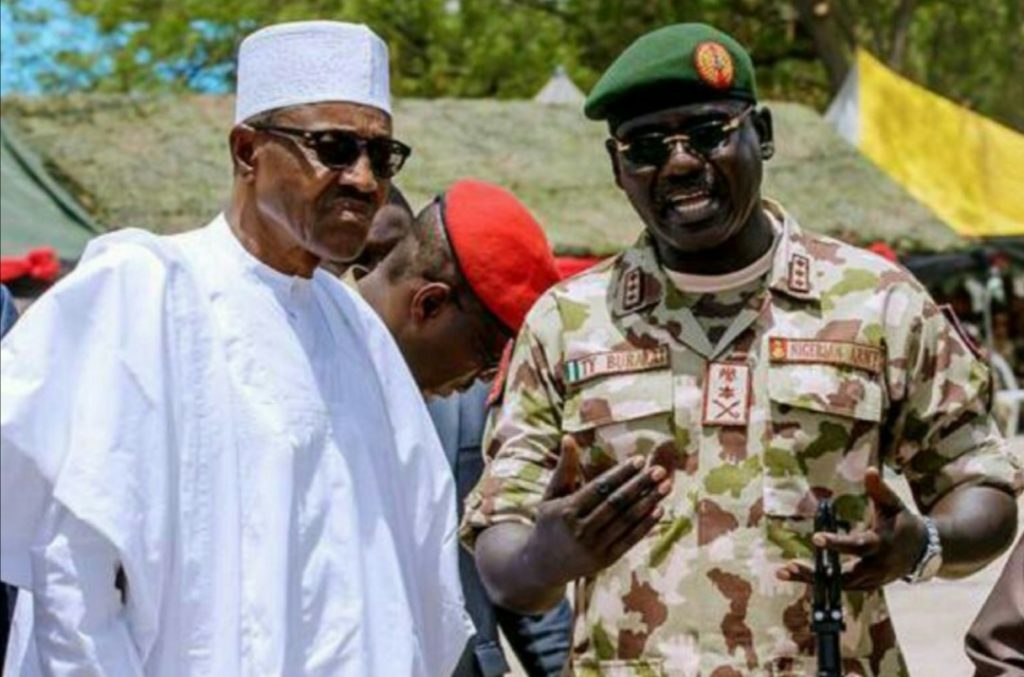By James Giwa
Last week Thursday, President Muhammadu Buhari, had a cause to meet with top security chiefs in the country to discuss the recent security breaches in the country in which over a hundred persons lost their lives.
Nigerians were happy to see the President rise to the occasion to address the unfortunate incidents that happened in Gubio Local Government of Borno State and in Faskari Local Government of Katsina State as it is considered a step forward towards understanding the issues that led to the breaches and what could be done to avert recurrence.
As news clips of the event were being relayed however, not a few were quick to notice a slip which from all indications is capable of worsening the security situation in the country when the National Security Adviser, Major General Babagana Monguno (rtd), said President Buhari reprimanded the service chiefs over alleged failure to curb worsening insecurity in the nation and that the President reportedly told the top military officers their “best was not good enough.”
He said: “Mr. President expressed great concern over the declining security situation in the country. He is extremely unhappy about what is happening. He feels that even though the security agencies are doing their best, their best is not good enough for him and he wants an immediate reversal of the current trend and immediate reversal of our misfortunes in all their dimensions.”
While it may not be right to say that the NSA prevaricated on the essence of what the President told the service chiefs at the meeting, it would not be out of place for one to point how unlikely it is for the President to make such conflicting rhetoric.
One, the President is not known to be ambiguous when making a speech.
Two, he is known as a man who doesn’t waste words to impress his audience but goes straight to the point when talking.
Three, there’s no way the President would have at one point observe that the security chiefs had already given their best and again go ahead to charge them again to go and do more.
Four, the President is always very serious about matters of security that he would not have allowed any ambiguity in his comments at the meeting.
Finally, it seems likely and in context with the account of various sources at the meeting, that the President mentioned the service chiefs in the bid to encourage them to give in their best in light of the current challenges.
Based on this analysis, it is obvious that what the president said at the meeting and was taken out of context in the course of transmission to the general public was that while the security chiefs are trying to put in their best, certain factors may have accounted for the recent lapses recorded and therefore asked the sevice chiefs to look into these issues and address them as appropriate.
From all indications, the President believes in the capability of the service chiefs and only told them they can do more to spur them into more action, but not to discourage them.
This is more so because the President and majority of Nigerians appreciate the enormity of the security challenges in the country and what the service chiefs and the troops have been doing in the theaters of operation.
Many are aware that in the last three months, Nigerian troops have raided the camps of insurgents, neutralised over 1400 of them, captured over 116 of their informants as well as destroy many of their weapons and bunkers.
But the NSA in conveying the message of the President clearly understated this and concentrated on a negative aspect which is capable of doing more harm than good to the already bad security situation in the country.
One would have thought that since the NSA was carefully chosen to address the press on the outcome of the meeting due to the sensitive nature of the issues involved and because his position as NSA puts him in a better place to analyse and synthesize every sensitive information to be given to the public in the most mature and appropriate way, he should have handled the briefing better.
But what one saw of the NSA at the briefing was no different from what a politician with covert ambition would have done to ridicule his opponent.
Either the NSA lost his composure when faced with cameras or he deliberately did not analyse the information at his disposal in a manner required of an intelligence officer of his calibre and ended up ridiculing the service chiefs by saying their best was not good enough.
To security experts, even if the President had said so, it takes a level of myopia and lack of appreciation of the relevance of information as a potent tool in the fight against insurgency and terrorism for the NSA to have revealed that because saying such a thing is akin to giving a veiled commendation to Boko Haram and ISWAP insurgents that they are on the right track.
But this is most unfair and totally uncalled for given the much the sevice chiefs have given of their time, resources, intellect and experience to turn things around not to talk of the sacrifice of troops at the battlefield.
People are aware that the Chief of Army Staff, the Chief of Naval Staff and the Chief of Air Staff have at one time or the other been compelled to relocate to the theaters of operations in the Northeast.
Only last week, all three had to move to Katsina to arrest the situation in the Northwest.
The chief of army staff had to remain in the trenches in the Northeast since March and only came to Abuja to brief the President as he has assured Nigerians that he will be going back.
For Monguno to give the impression that all these efforts were not appreciated by the President to me, is the height of mischief if done deliberately; and the height of insensitivity if said in error, as his statement will no doubt demoralize the troops who are sacrificing everything to make sure they defend the country.
One thing I find curious also is how the NSA cleverly excluded himself from the reported reprimand by the President which he said was intended at only the service chiefs.
While it is now clear that the President could not have said the best of the service chiefs is not good enough, entertaining such a viewpoint exposes the shallow mindedness of the NSA to the overall security structure of the country because Monguno, as the National Security Adviser to the President is part of the security and intelligence network of the country and if indeed the President had in any way implied that the service chiefs are not doing enough then he cannot be excused from blame.
This is self- indicting on the part of the NSA because while one could point a finger at one or two things the service chiefs have done to halt worsening security situation in the country, one cannot point at a single thing the current NSA has done in that regard.
He has not been seen either engaging the relevant agencies with ideas or counter strategies nor using the vast resources and information at his disposal to penetrate the ranks of the insurgents.
It is surprising that with the glaring inactivity from his side, the NSA still finds the courage to mouth disparaging remarks about other service chiefs in the country disguised cleverly as quoting the President.
In order to avoid this kind of counter intuitive slip in future, i will advise the NSA to begin to see himself as part of the team required to bring lasting solution to the security situation in the country rather than continue in this posture where he sees himself as an external examiner whose only function is to supervise the service chiefs.
Giwa a concerned citizen wrote this piece from Rayfield, Jos.

